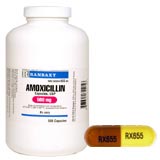This issue is currently controversial. To prevent the development of antibiotic resistance in bacteria, doctors often recommend continuing antibiotics even after symptoms have disappeared to prevent bacteria from having a chance to resurge.
|
|
|
Amoxicillin Antibiotic (Image: sitemaker.umich) |
However, this guideline may not be suitable for all infections: excessive use of antibiotics can also create resistance in bacteria.
A group of Dutch researchers led by Jan Prins asserts that pneumonia can be cured in just 3 days instead of the typical 7 to 10 days. They monitored the cases of 129 patients hospitalized with mild pneumonia.
These patients received intravenous amoxicillin for 3 days. Half of them then continued treatment with this medication in pill form, while the other half received a placebo, all within a 5-day period. Eight days later, the recovery rate (90%) was the same among all patients. This study has been published in the British Medical Journal.
The effectiveness of short-term antibiotic use has been previously demonstrated for certain urinary tract infections in women or gonorrhea. Conversely, for Staphylococcus aureus, longer treatment is recommended.
Therefore, to determine the most effective treatment duration, researchers need to conduct clinical trials for each infectious disease. Ultimately, it is the doctor who decides the duration of medication use.



















































